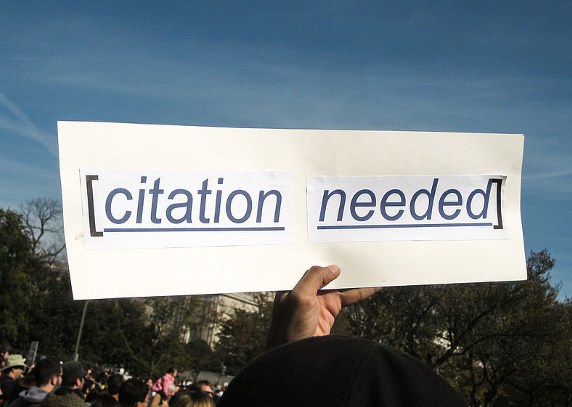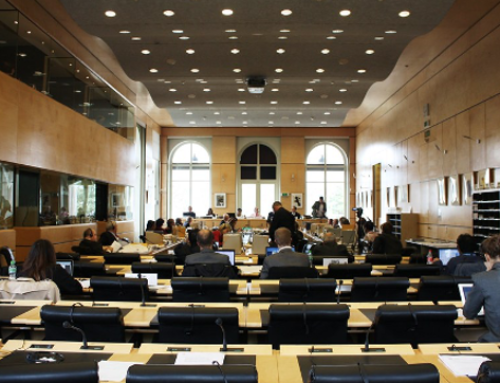In anthropological writing, we adhere to fairly standard citational practices, similar to most other disciplines. If a colleague has previously published on a topic we are engaging with, there is an expectation that we will engage with or reference their work to illustrate our own intellectual journey and debts, and to give them credit for their labor and their intellectual innovation on the subject. Another expectation in anthropological writing is that we typically change the names of our interlocutors in order to conceal their identities. What happens when we take these practices together, in the same methodological space, as opposed to considering them to be two separate issues with different ethical rationales? What happens when we choose to see these two practices as a unified system of citation and anti-citation, of contextualization and misdirection, and perhaps even of attribution and appropriation? While we have long acknowledged the need for reciprocity with our interlocutors, be it through shared goals, friendship, favors, or money, the use of pseudonyms denies reciprocity. Using pseudonyms implies that intellectual property and innovation are valued by academics, but do not have the same currency in the world of our interlocutors.
An anthropology degree does not always include formal training in ethics or methods. In contrast to many of my peers, I actually received a very thoughtful and nuanced education in both. The professor responsible for my graduate education in these topics was Rena Lederman, one of the few anthropologists in our discipline who has taken questions of disciplinary methods and ethics as a topic of research inquiry itself (e.g., 2006a, 2006b, 2007). At this early stage of my career, I was gifted with discerning and careful conversations about fieldwork relationships, the products of these relationships as evidence, the peculiar mixing of work and life in ethnographic research, and more. As such, I consider myself far luckier than most. I have heard accounts from colleagues regarding their methods instruction that sound as if they were taught research ethics by Indiana Jones or some other colonial cowboy anthropologist.
When I started in my faculty position, I took over much of my department’s “methods” education. While I felt well prepared to support my students in many of their dilemmas, the subject of pseudonyms always stumped me. I never was able to offer a justification for their use that felt in line with the evolving values of the discipline. Pseudonyms are explained by the need to protect our interlocutors according to a biomedical ethical model applied to all “human subject” research, an aim that places the anthropologist in the role of steward or guardian. There are a number of stances towards interlocutors that I have encouraged students to take, depending on the subject of research: collaborative, ambivalent, even critical.1 “Guardian” was never one of these stances. I would not be the only one in this collection to say that pseudonyms seem to have paternalistic overtones. Paternalism is a strong word, especially referring to a practice that most of us, including myself, participate in, and a word which raises some pretty significant specters of anthropology past (Stocking 1989, 1991). Rather than just tossing around the accusation, in what follows I would like to explore one element of the actual harm that I believe pseudonyms do. Specifically, I want to explore the implications of the fact that we make an active effort to cite other scholars for their ideas, and we also make an active effort to avoid citing our interlocutors for their ideas. I believe that this practice, of citation and the disciplinary reversal of our scholarly citational practices, what I am calling anti-citation, serves to create and reproduce a distinction between ourselves and our interlocutors as two different kinds of people, keeping our interlocutors at a distance and apart from of our system of value.

Image Author: futureatlas.com (https://creativecommons.org/licenses/by/2.0/deed.en)
I have experienced these concerns intensely in my own research. I have always worked with activists. This was the case during my first project with Jewish Israeli conscientious objectors and currently with Jewish and Palestinian non-liberal religious peace activists. These activists are all part of organizations trying to create social change. As such, they are involved in practices of public self-representation and also seek publicity. When I invite my interlocutors to my talks, they often inquire whether I will be speaking about them. When I describe the articles I am writing, they often ask whether I will be writing about them. The caveat that I will be speaking and writing about them through pseudonyms has not been a popular one, to say the least. I have been told that it is too bad, because if I was speaking about them explicitly they would invite all of their supporters, or I wrote about them directly, they could send my writing to would-be donors to demonstrate their active engagement with academia.
My unwillingness to name names directly impacts my ability to engage in relationships of meaningful reciprocity with my interlocutors. They not only give me access to their activities and work, but also frequently invite me to speak at their own events, effectively promoting me as an academic expert in this field, and certainly contributing to advancing my career. Using pseudonyms limits my ability to reciprocate in ways that are meaningful to my interlocutors, and more specifically, to reciprocate in ways that make the most of my abilities, competence, and authority, that is, representation in academic literature. I certainly try to repay my debts. I have taken notes, written reports, presented to the organization’s members and at their events, and given comments and notes on reports and applications. But not naming in a symmetrical way leaves me with an ongoing sense of indebtedness.
Reciprocity in anthropology has come a long way. Today, it is often expected that anthropology will be a shared project. Many in the discipline now believe that anthropological work should not be a process of extracting knowledge for the benefit of some moralized yet decontextualized notion of science, but rather, should be of direct benefit to the people with whom we work. But, I would argue that these efforts, such as paid participation, explicit attempts at reciprocity, or efforts to acknowledge shared goals have not fully made the relationship symmetrical or mutual, specifically because of our reluctance to name our interlocutors. What we offer as compensation for participation in our research demonstrates what we believe is important to our interlocutors. Sometimes cash is the currency offered, but more typically anthropologists offer friendship or labor. What we have not done is this: as a discipline, we have not recognized the importance of intellectual property in relation to naming the sources of the practices, work, and insights that we describe in our ethnography. We are prevented from extending this recognition by our pseudonym practices.
It is worth pausing to consider the assumptions that underlie this categorization of ideas and acts into those who must be cited and those for which the identity of the actor/thinker must be occluded. By not citing a person who says something to us during fieldwork, there is an implication that this statement is representative, and not unique to the person, but rather reflects their culture or identity in a very direct and transparent way. There is an assumption that the words and actions are unmediated by the person, or in a sense instinctual or natural to them. By contrast, our work, and the work of those we cite is not interchangeable, it is individual. It is not instinctual, but rather analysis, which is virtuosic and creative. 2
They provide evidence; we analyze it. As Paloma Gay y Blasco and Liria de la Cruz Hernàndez write in a rare written collaboration between “informant and anthropologist,” our research participants have remained the “objects rather than creators of anthropological knowledge” even after the reflexive turn (2012, 1). This implied distinction between what our interlocutors do and what we do can be expressed through the analogy of skilled and unskilled labor. One of the defining features of unskilled labor is that the laborer is interchangeable, and the product of the labor is generic and does not have an intellectual component. In the case of ethnography, a person with a pseudonym is one whose main identity is being a member of the society or group we are studying, by definition interchangeable with other members of the group. As much as we have for decades recognized that people theorize themselves, and are reflective regarding their own culture, beliefs, and values, their statements and acts are still presented as data that requires our analysis and skilled intellectual labor. Here too, the exception proves the role, such as when ethnographies of white-collared powerful subjects (such as politicians, lobbyists, and policy professionals) present people with their real names without explicit justification for this anomaly, as though it is the natural thing to do (Garsten 2021).
I felt pushed by the boundaries of methodological plausibility when I had the bizarre and embarrassing experience of citing interlocutors when I quote what they have written, but using pseudonyms when I quote what they have said, even in the same article. A significant number of my interlocutors have either been professors or scholars who publish academically alongside their activism. I have had the occasion to cite the academic work of my interlocutors in my own writing because their analysis was pertinent to my topic. But, when describing how these people were involved in events and conversations at my field site, I wrote them into ethnographic scenes using pseudonyms.
Rereading this writing, knowing that these “scholars” and “characters” are one and the same is a surreal experience. Yet, rereading allows me to see the effects of these writing choices in a new way that has implications for all ethnographic writing, specifically the way our inherited writing practices jealously preserve intellectual recognition for ourselves and the “scholarly class.” In one article, I wrote about a group of ultra-Orthodox Jewish and Muslim social workers in Israel who shared a concern for an unrecognized form of domestic abuse afflicting their communities, violence against women that is done in the spiritual/religious realm. One member of the group, Tsipy Levy, was both an acting social worker and also teaches at the university level and writes academically. When I quote her speaking as a member of the group, she appears “of the field,” her ethnic identity, her gender, her religiosity, and her job all hold significant relevance to the account, though her name is not revealed. One reads an ultra-Orthodox woman expressing a spontaneous and instinctual frustration regarding the failure of Israeli authorities to recognize the suffering she sees in her community. By contrast, when I cite her writing, her other identifying characteristics are not featured, and she is simply a scholar giving a disinterested analysis of the cultural phenomenon of spiritual abuse that moments ago, she was portrayed as being embedded within. This effect is the result of a number of factors, all of which combine to reproduce some problematic hierarchies. One is that speech, with its hesitancies, informality, colloquialisms, “ums” and “uhs,” reads as less sophisticated than written quotes, which reinforces the well-known ethnocentric hierarchy of written knowledge over oral knowledge (Battiste 2016; Navabi 2006; Mazama 1998).
In addition, Tsipy Levy was given a first/given name pseudonym, as is most typically the case with anthropological pseudonyms, while the citation refers to her last/family name. This difference plays into the dynamic in which people of lesser social status, servants, slaves, and blue collar workers can be referred to by their first names, while professionals and members of the upper class are referred to by their last names or with honorifics. My use of first names reflects the more intimate nature of the fieldwork relationship. Indeed, in real life, I call these people by their first names, as they do each other, and so it makes sense that I would represent the informality of the interaction in this way. Nevertheless, in translation to text, it still invokes the class hierarchy implied by the differential use of first and last names.
A further hierarchy is established when I present Tsipy’s statements in the section presenting evidence, while her scholarship is quoted in the discussion. This further contributes to the artificial distinction between culture as instinct and analysis as intellectual labor. Anthropological writing generally does not label the sections in articles “Findings/Results” or “Discussion,” as other social science disciplines, especially the quantitative ones, often do. We usually name these sections in ways that more specifically relate to the material and topic presented. Nevertheless, most of our articles follow this same structure, especially in journal articles that often have stricter conventions for publication, and thus the difference is more aesthetic than substantial. If I hadn’t used a pseudonym in the “Findings” section, the illusion of this distinction between data and analysis as separate tasks for different types of people would have been challenged.
Finally, when I cite my research participants as academics on topics like theories of reconciliation, the history of conscience, Jewish thought, or Western imperialism, their writing is abstract, etic, and theoretical. When I quote them as activists, their spoken statements are more emic, concrete, and socially embedded as they discuss the experiences of reconciliation with Palestinian neighbors, of their own pangs of conscience, of their own Jewish identity. The juxtaposition, without knowing that these people are one and the same, appears to divide people into two categories, those who are reflective and analytical and those who are unreflective and embedded in the daily realities and emic categories of local cultural life. Though this distinction between the academic identity of my interlocutors and their day-to-day identity extends beyond my own methodology, it is worth considering nonetheless. This distinction is largely out of my control; these scholars are themselves also participants in norms of scholarship that value the theoretical and the abstract above grounded and empirical work (Lutz 1995, 250). Catherine Lutz has shown that abstract theory is considered weightier and more substantial (and associated with male writing) than work that is grounded in specific cases, or is descriptive or personal (1995, 250-253). Though one cannot control the norms of academic writing, not using a pseudonym for these individuals would help to challenge this binary effect by showing that these emic/embedded and etic/abstract perspectives are two modes of engagement from the same person.
My use of this example is not to suggest that academics should be exempted from the practice of pseudonyms because of some exceptional status or ability, but rather to recognize the way this is problematic for all interlocutors regardless of their participation in scholarly publication. In this short essay, I think about our practices of scholarly citation together with our practice of pseudonyms as a system of citation and anti-citation. I suggest these practices create a false dichotomy between the field and academia, wherein essentially different types of labor are conducted, ones that necessarily require different types of compensation. It assumes that the academic currencies of recognition and intellectual property are not relevant to our interlocutors. This assumption is problematic and reproduces class and ethnocentric hierarchies that are out of step with our current disciplinary ethics in other areas.
It is wrong to assume that intellectual credit is not relevant to our interlocutors. Mine have told me that it would help them. And why wouldn’t it? The social and professional circles they move in are not far removed from my own, and often have similar standards of evaluation and advancement. The anthropological practice of pseudonyms implies my interlocutors live in a very different world than I do. But, intellectual property, credit for ideas and innovation, has today become relevant currency far beyond the halls of academia. With all due respect to my friendship and that of my fellow anthropologists, this and other traditional forms of “reciprocity” no longer suffice in terms of modern expectations of mutual benefit. Thus, I am hopeful that pseudonyms will one day become the exception rather than the rule.
Acknowledgments: Thank you so much, Carole, for starting this conversation. It is important and overdue. Thank you to all of the participants in this project, those who wrote for this collection and those who spoke with us and generously offered their insights.
Notes:
[1] For an example of critical stance, see Nitzan Shoshan 2014.
[2] The notion that people transparently reflect or are representative of their culture recalls the way indigenous “tourist” art is valued for its “authenticity” and traditional reproduction of the craft, while innovation and creativity in art is reserved for Euro-American artists (Chibnik 2006; Chibnik et al 2004).
References
Battiste, Marie. 2016. “Research Ethics for Chapter Protecting Indigenous Knowledge and Heritage.” In Ethical Futures in Qualitative Research: Decolonizing the Politics of Knowledge, edited by Norman Denzin and Michael Giardina, 111-132. London and New York: Routledge.
Chibnik, Michael. 2006. “Oaxacan Wood Carvings in the World of Fine Art: Aesthetic Judgments of a Tourist Craft.” Journal of Anthropological Research 62(4): 491-512.
Chibnik, Michael, Rudi Colloredo‐Mansfeld, Molly Lee, B. Lynne Milgram, Victoria Rovine, and Jim Weil. 2004. “Artists and Aesthetics: Case Studies of Creativity in the Ethnic Arts Market.” Anthropology of Work Review 25(1‐2): 3-8.
Garsten, Christina. 2021. “A Window Onto Capital Hill: Cunning Conservatism and Shadow Politics.” kristik ethnografi: Swedish Journal of Anthropology. 4(1): 9-23.
Gay y Blasco, Paloma and Liria de la Cruz Hernàndez. 2012. “Friendship, Anthropology.” Anthropology and Humanism 37(1): 1-14.
Lederman, Rena. 2007. “Comparative” Research”: A Modest Proposal Concerning the Object of Ethics Regulation.” PoLAR: Political and Legal Anthropology Review 30(2): 305-327.
———. 2006a. “Introduction: Anxious Borders between Work and Life in a Time of Bureaucratic Ethics Regulation.” American Ethnologist 33(4): 477-481.
———. 2006b. “The Perils of Working at Home: IRB “mission Creep” as Context and Content for an Ethnography of Disciplinary Knowledges.” American Ethnologist 33(4): 482-491.
Lutz, Catherine. 1995. “The Gender of Theory.” In Women Writing Culture/Culture Writing Women, edited by Ruth Behar and Deborah Gordon, 249-266. Berkeley: University of California Press.
Mazama, Ama. 1998. “The Eurocentric Discourse on Writing: An Exercise in Self-Glorification.” Journal of Black Studies 29(1): 3-16.
Navabi, Maryam. 2006. “The Power of Oral Tradition: Critically Resisting the Colonial Footprint.” In Anti-Colonialism and Education: The Politics of Resistance edited by George J. Sefa Dei and Arlo Kempf, 175-192. Leiden: Brill Press.
Shoshan, Nitzan. 2014. “Managing Hate: Political Delinquency and Affective Governance in Germany.” Cultural Anthropology 29(1): 150-172.
Stocking Jr., George W. 1989. “The Ethnographic Sensibility of the 1920s and the Dualism of the Anthropological Tradition.” In Romantic Motives: Essays on Anthropological Sensibility edited by George W. Stocking Jr., 208-276. Madison: University of Wisconsin Press
Stocking Jr., George W. 1991. Victorian Anthropology. New York: Free Press.
Cite as: Weiss, Erica. 2021. “Pseudonyms as Anti-Citation.” In “Rethinking Pseudonyms in Ethnography,” edited by Carole McGranahan and Erica Weiss, American Ethnologist website, 13 December 2021, https://americanethnologist.org/features/collections/rethinking-pseudonyms-in-ethnography/pseudonyms-as-anti-citation
Erica Weiss is associate professor of anthropology at Tel Aviv University.




